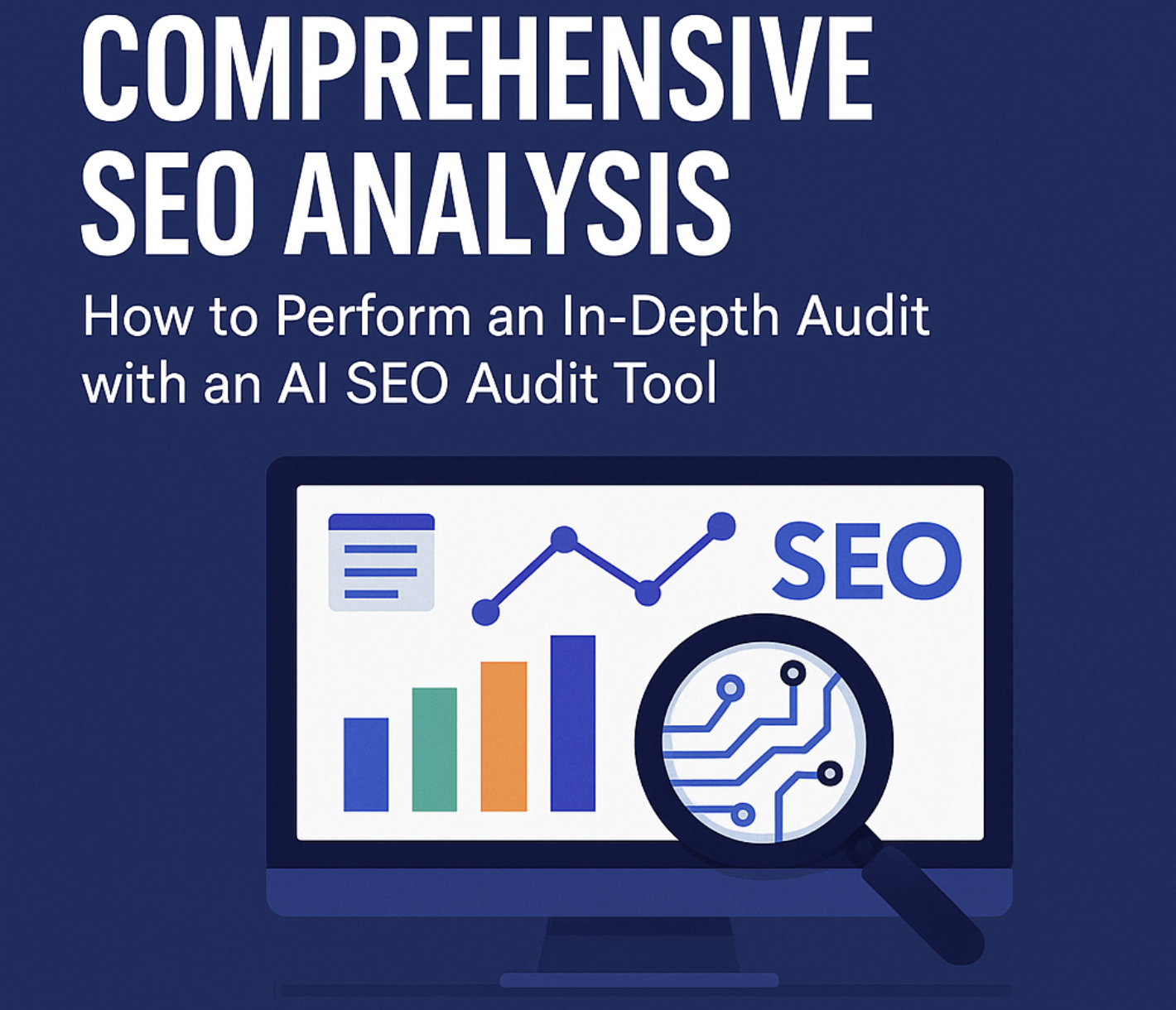
A comprehensive SEO analysis is more than a routine check it’s the backbone of effective website optimization. With search engines evolving rapidly, only a thorough, data-driven approach uncovers the real factors that drive organic growth. AI-powered SEO audit tools have emerged as indispensable allies, blending automation, intelligence, and actionable insight. This guide explores how to conduct a comprehensive SEO analysis using cutting-edge AI solutions, so you can stay ahead of your competitors and maximize every opportunity.
- Understand the true scope of comprehensive SEO analysis and why it matters
- Discover the unique advantages of AI SEO audit tools for all types of websites
- Follow a step-by-step process to audit, optimize, and measure your site’s SEO performance
- Implement best practices to ensure continuous improvement and sustainable rankings
- Get actionable answers to common SEO audit questions from the field
Table of Contents
ToggleUnderstanding comprehensive SEO analysis
A strong SEO foundation starts with understanding what a comprehensive SEO analysis really entails. Let’s break down the essentials and the unique value AI brings to the table.
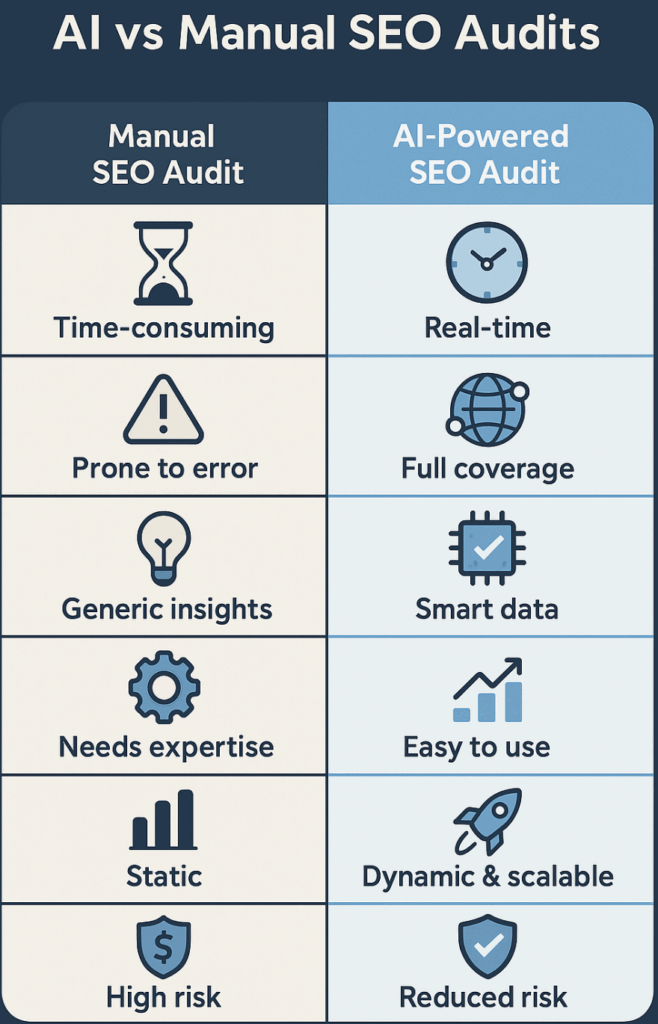
What is a comprehensive SEO analysis?
A comprehensive SEO analysis is a full-spectrum evaluation of your site’s health, search visibility, and growth potential. It looks far beyond surface-level metrics, examining technical SEO, on-page factors, content quality, user experience, and authority signals like backlinks. By investigating every layer structure, content, performance, and off-page elements a comprehensive SEO analysis ensures your site is fully optimized for both users and search engines.
Why every website needs a thorough SEO audit
Search engines continually update their algorithms, and what worked yesterday may no longer be enough. Regular audits help uncover hidden issues like duplicate versions, slow site speed, or missed keyword opportunities that may be holding back your rankings. Whether you’re an e-commerce founder or a content-driven business, skipping a thorough SEO audit can result in traffic drops, poor user experience, and lost revenue opportunities.
Key benefits of using AI for SEO analysis
AI SEO audit tools like Hack The SEO revolutionize website analysis by automating complex tasks, providing real-time insights, and surfacing opportunities that manual checks can miss. With features such as live competitor gap analysis, NLP-powered content scoring, and automated technical audits, AI reduces human error and compresses days of research into actionable recommendations delivered in minutes.
In short, understanding and embracing comprehensive SEO analysis especially when powered by AI is fundamental to unlocking your site’s full organic potential.
Preparing for an AI-powered SEO audit
Preparation is the key to a successful SEO audit. Before diving into the AI tools, clarify your objectives, gather the right resources, and set a benchmark for meaningful analysis.
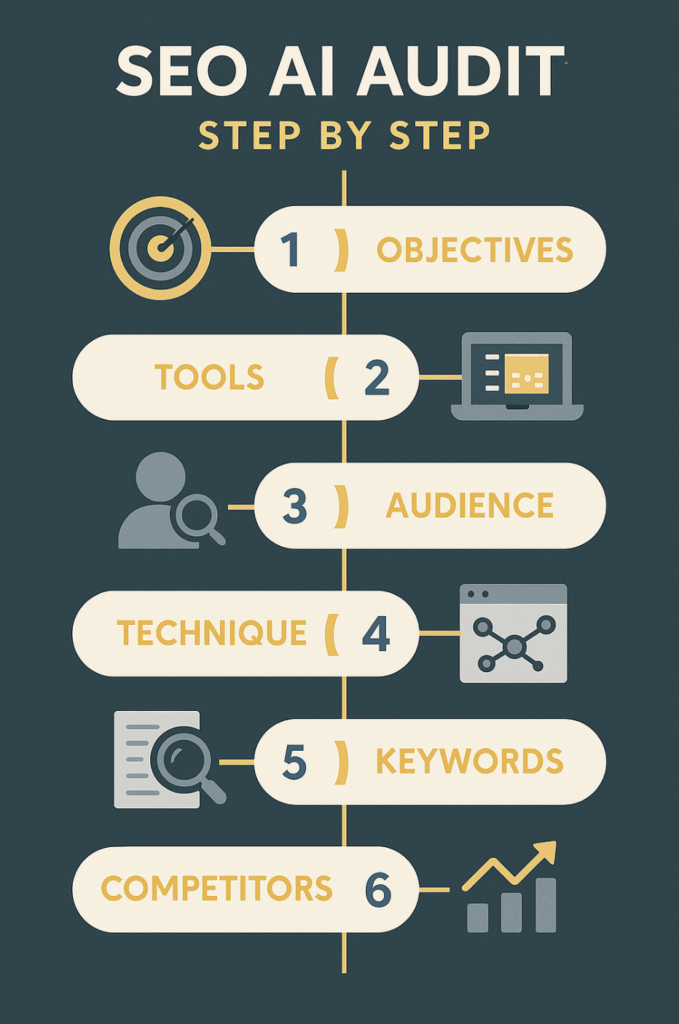
Defining your SEO objectives and goals
Start by asking a crucial question: What are you hoping to achieve? Whether you aim for higher rankings, more organic traffic, or improved conversion rates, defining clear, measurable objectives focuses your audit and ensures you’re tracking the right metrics for improvement.
Gathering essential tools and resources
For an AI-driven audit, equip yourself with advanced software like Hack The SEO, which centralizes technical crawls, content analysis, keyword research, and performance monitoring. Ensure you have access to Google Search Console, analytics platforms, and any internal data on your site’s structure and goals.
Understanding your target audience and their search intent
Effective SEO starts with your users. Use AI-driven insights to analyze which keywords your audience is searching, what content resonates, and how search intent evolves over time. This helps you tailor your site structure and content to match real user needs, not just search engine guidelines.
Reviewing website structure and technical foundation
Before running your audit, evaluate the technical underpinnings of your site: Is your architecture logical and crawlable? Are there duplicate domains or outdated redirects that might confuse search engines? A strong technical foundation ensures AI audit tools can accurately analyze and diagnose all relevant elements.
Compiling a strategic list of target keywords
Identify your primary and secondary keywords, focusing on both high-volume and long-tail opportunities. Use AI keyword research tools to surface terms with high opportunity scores, and map them to relevant sections and pages for focused optimization.
Benchmarking against competitors
Analyze your competitors to understand their strengths and weaknesses. With tools like Hack The SEO, you can identify gaps in their content, backlink profile, and technical setup giving you a roadmap for outperforming them in the search results.
In summary, thorough preparation enables a targeted, effective AI-powered audit that goes beyond surface-level results.
Step-by-step process for a comprehensive SEO analysis with AI
Ready to get hands-on? Here’s how to run a truly comprehensive SEO audit using the latest AI-powered tools, ensuring no critical element is left unchecked.
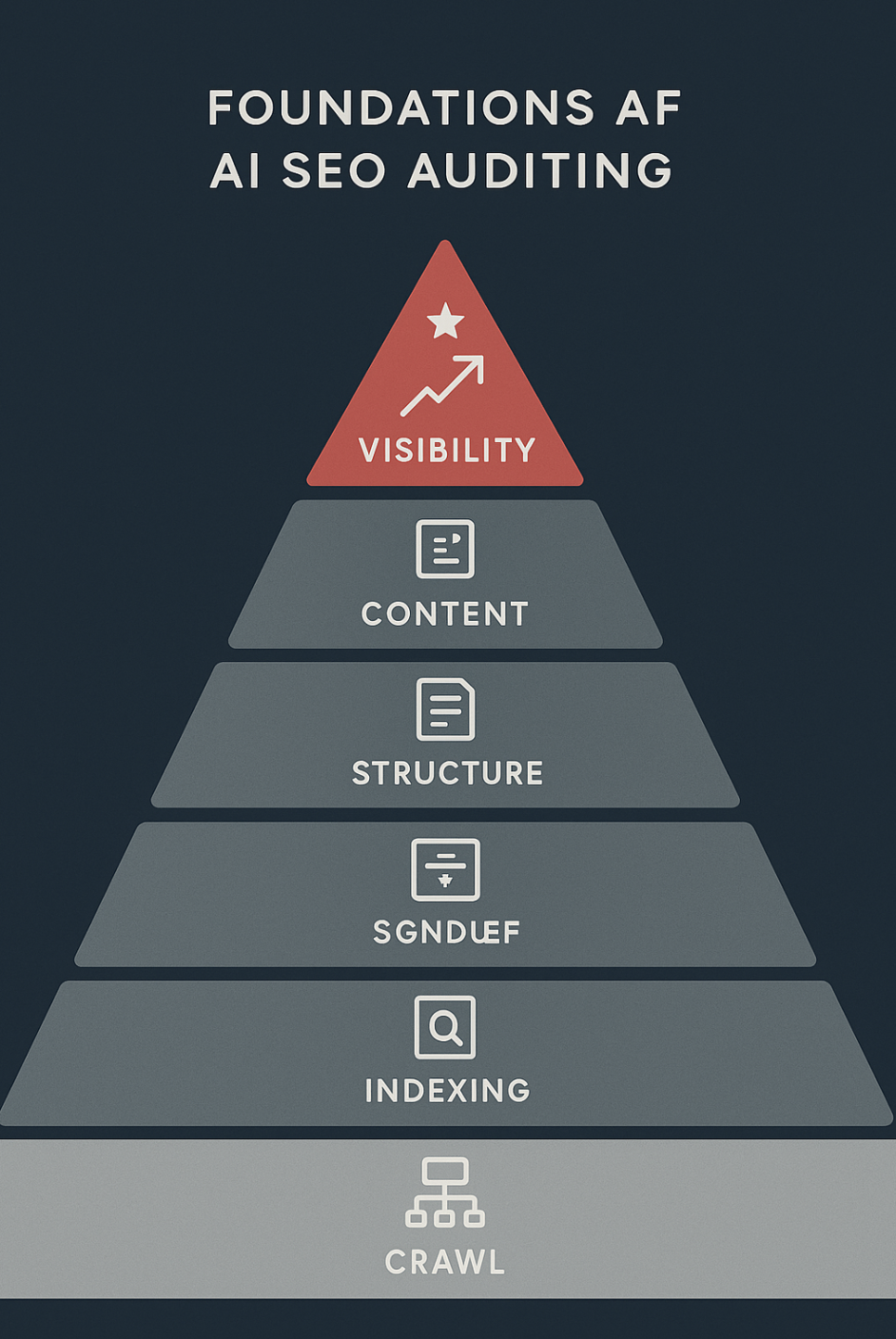
Selecting the right AI SEO audit tools
Choose a solution that offers a complete suite: technical crawls, keyword research, content optimization, and backlink analysis. Hack The SEO stands out by consolidating all these features, providing an intuitive dashboard and advanced AI agents that automate the most time-consuming audit tasks.
Integrating AI tools with your website for data collection
Connect your site to the audit platform often as simple as adding a code snippet or verifying domain ownership. This integration enables live crawling, real-time keyword tracking, and seamless synchronization with Google Search Console, giving you a holistic view of your site’s performance and indexed pages.
Ensuring your website is indexed and free of duplicate versions
Confirm that only your preferred version of your site is indexed. Check for www vs non-www, HTTP vs HTTPS, or staging domains. Use AI to scan for duplicate content or accidental noindex tags and remove them to prevent dilution of your authority score and rankings.
Evaluating mobile-friendliness and site speed
Google’s mobile-first indexing means mobile usability is non-negotiable. AI tools simulate real user experience across devices, flagging slow-loading elements and offering actionable suggestions for improvement. Fast, responsive sites see higher rankings and lower bounce rates.
Running a technical crawl to identify errors and Core Web Vitals issues
Initiate a full-site crawl to detect issues like broken links, incorrect redirects, duplicate descriptions, missing meta elements, or Core Web Vitals problems (such as LCP, FID, CLS). AI platforms automatically prioritize errors by impact, helping you fix what matters most first.
Reviewing and optimizing on-page SEO factors
Analyze each page’s titles, meta descriptions, header structure, internal links, and keyword targeting. AI-powered recommendations highlight missing or duplicate elements, suggest improvements for readability, and ensure your content aligns with both user intent and search guidelines.
Analyzing content quality, uniqueness, and relevance
AI examines your content for duplication, thin sections, and topical gaps. It also assesses NLP signals to ensure your content demonstrates expertise and relevance. Recommendations often include ways to expand, update, or reorganize your content to better serve users and rank for competitive keywords.
Checking and optimizing your backlink profile
Backlinks remain a crucial authority signal. AI-driven tools scan your backlink profile for toxic links, authority score, and lost links. They also uncover new link-building opportunities by analyzing your competitors and suggesting outreach targets.
Analyzing organic traffic and keyword opportunities
Track your organic traffic and the keywords driving it. AI visualizes performance over time, flags anomalies like traffic drops, and surfaces untapped opportunities—new keywords or topics that could boost your results with targeted optimization.
Identifying missed SERP features and additional ranking opportunities
Modern SERPs offer rich features: featured snippets, People Also Ask, image packs, and more. AI tools highlight which features you’re missing and guide you in optimizing your content to win these enhanced placements, giving you an edge in crowded results pages.
Finding and fixing broken links and redirection issues
Broken links and misconfigured redirects can degrade user experience and authority. AI detects all such issues, prioritizes them, and provides actionable fixes. Make sure to remove them promptly to protect your rankings and credibility.
Ensuring compliance with structured data and schema markup
Structured data helps search engines understand your content and can unlock rich results. AI audits ensure your markup is accurate, up-to-date, and compliant with the latest guidelines, helping you secure visibility-boosting SERP features.
Integrating with analytics and webmaster tools for ongoing monitoring
Seamless integration with analytics and webmaster platforms (like Google Search Console) allows you to monitor key metrics, analyze performance, and receive real-time alerts for new issues or opportunities. Regular reporting makes it easy to track improvement over time.
Following this step-by-step process ensures that your comprehensive SEO analysis covers every critical element, from technical health to content quality and beyond.
Implementing and monitoring AI-driven SEO recommendations
Turning audit findings into tangible results requires systematic implementation, continuous monitoring, and agile adaptation to change.
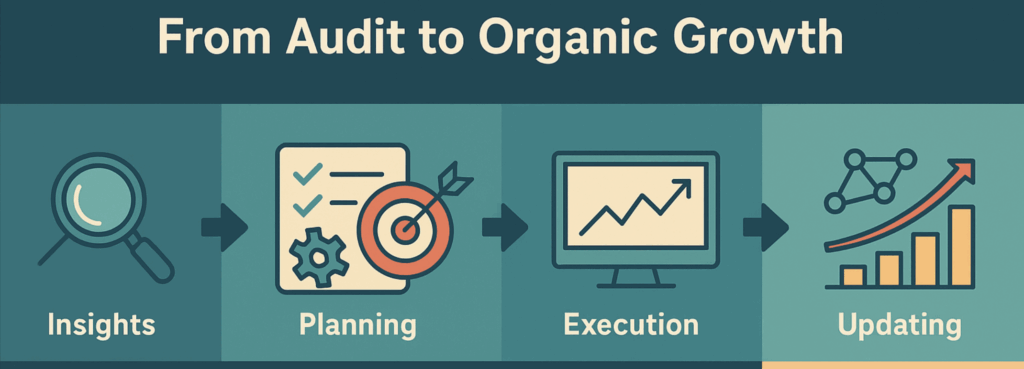
Putting audit insights into actionable strategies
Use the prioritized recommendations from your AI audit to develop a clear action plan. Address high-impact issues first such as critical technical errors or content gaps then move to enhancements like schema markup or SERP feature targeting.
Customizing and prioritizing recommendations based on business needs
Not every fix is equally urgent. Align AI suggestions with your business priorities, focusing on sections of your site that drive the most value (e.g., top-converting pages or high-traffic content). This approach maximizes ROI from your SEO efforts.
Monitoring changes and measuring improvements
Track the effects of each change using your AI tool’s dashboard and integrated analytics. Monitor metrics like keyword rankings, organic traffic, authority score, and user engagement to ensure changes deliver measurable improvement.
Regularly updating and training AI systems for evolving SEO needs
SEO is dynamic. Periodically retrain your AI systems and refresh your audit settings to account for new search trends, algorithm updates, and business goals. This keeps your strategies relevant and effective over time.
Staying informed about the latest SEO trends and algorithm updates
Subscribe to industry news, participate in forums, and leverage AI insights to stay ahead of Google’s evolving algorithms. Continuous learning ensures you’re ready to adapt and maintain your site’s competitive edge.
In essence, implementation and monitoring close the loop turning audit data into lasting, organic growth for your site.
Best practices for using AI in SEO audits
To unlock the full potential of AI-driven SEO, follow these best practices to ensure data accuracy, process transparency, and sustainable results.
Focusing on data quality and accuracy
High-quality data is the foundation of reliable AI analysis. Ensure your AI tools have access to complete, up-to-date site data, and verify the accuracy of automated findings before acting on them.
Understanding the limitations of AI and when to use manual analysis
While AI excels at scale and speed, some nuanced issues like brand voice or subtle content gaps may require human review. Combine automated and manual analysis for the most robust audit results.
Ensuring scalability for different business sizes
Choose AI tools that scale with your business. Platforms like Hack The SEO offer flexible plans for startups, agencies, and enterprises alike, so your SEO strategy can grow as your needs evolve.
Continually educating your team on AI advancements in SEO
Invest in ongoing learning to help your team master new AI features and stay current with best practices. This empowers your business to make the most of emerging technology and maintain a competitive advantage.
Maintaining transparency and documentation of audit processes
Document your audit steps, changes, and results. Transparency ensures you can troubleshoot issues, demonstrate progress to stakeholders, and refine your process for even better results in the future.
By adhering to these best practices, you’ll build a robust, future-proof SEO strategy that delivers consistent results and adapts to new challenges.
FAQ
How do you perform a comprehensive SEO analysis with AI?
Start by integrating an AI SEO audit tool with your website and Google Search Console. The tool crawls your site, analyzes key technical and content elements, benchmarks against your competitors, and provides prioritized recommendations for improvement. Follow up by implementing the changes and tracking the results over time.
What are the essential steps in an AI-driven SEO audit?
The essential steps include: verifying site indexing and removing duplicate versions, running a technical crawl, evaluating site speed and mobile-friendliness, optimizing on-page SEO, assessing content quality, analyzing your backlink profile, tracking organic traffic and keywords, identifying missed SERP features, fixing redirects and broken links, and ensuring structured data compliance.
How do AI SEO audit tools improve website performance?
AI tools automate complex analysis, identify high-impact opportunities, and provide data-driven recommendations. They help you address issues faster, optimize your content and site structure, build authority through better backlinks, and continually monitor for ongoing improvement resulting in higher search rankings and more organic traffic.
What common technical issues can AI help identify?
AI can quickly spot broken links, slow-loading pages, duplicate descriptions, missing meta elements, Core Web Vitals problems, misconfigured redirects, and accidental noindex tags. It can also highlight gaps in your site’s structure or issues with schema markup and structured data.
How often should you perform an SEO audit?
Ideally, run a comprehensive SEO analysis at least quarterly, or after major site updates. Ongoing monitoring with AI tools can catch urgent issues in real time, ensuring your site stays optimized and competitive.
Can AI help with local and on-page SEO optimization?
Absolutely. AI platforms can analyze local search signals, optimize Google Business Profile elements, and provide tailored on-page recommendations for every content section, improving visibility in both global and local search results.
What’s the difference between manual and AI-powered SEO audits?
Manual audits rely on human expertise but can be time-consuming and prone to oversight. AI-powered audits automate data collection and analysis, scale to large domains, and surface insights instantly. The best results come from combining AI speed with human judgment for nuanced issues.
These answers address the most pressing questions marketing teams and SEO professionals encounter during a comprehensive SEO analysis.
A comprehensive SEO analysis is essential for unlocking your site’s full potential. By leveraging AI-powered audit tools, you automate complex processes, surface deep insights, and continually adapt to search engine changes. This approach empowers teams regardless of size to compete with industry leaders, drive organic growth, and achieve measurable improvement faster than ever before.
- Comprehensive SEO analysis drives better rankings and sustainable traffic
- AI SEO audit tools, like Hack The SEO, deliver actionable, real-time insights
- Follow a structured, step-by-step process for maximum impact
- Continual monitoring and adaptation ensure lasting results
- Embrace AI-driven audits to stay ahead in the digital landscape
Sources & Références Officielles

Eric Ibanez
Co-fondateur de Hack The SEO
Eric Ibanez a créé Hack The SEO et accompagne des stratégies SEO orientées croissance. Il est aussi co-auteur du livre SEO pour booster sa croissance, publié chez Dunod.
Suggested Articles


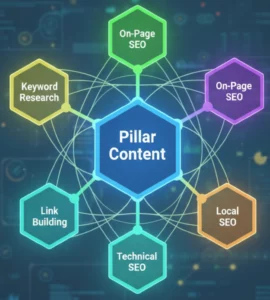
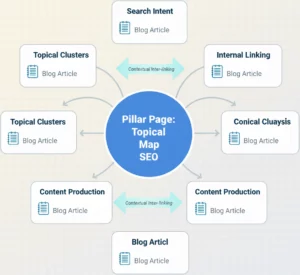
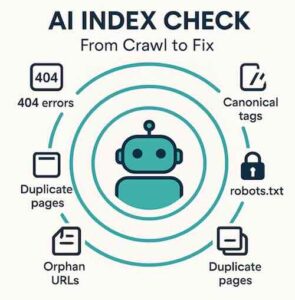
5 thoughts on “Comprehensive SEO analysis: how to perform an in-depth audit with an AI SEO audit tool”
Great article ! Thansk a lot i ll begin with your platform